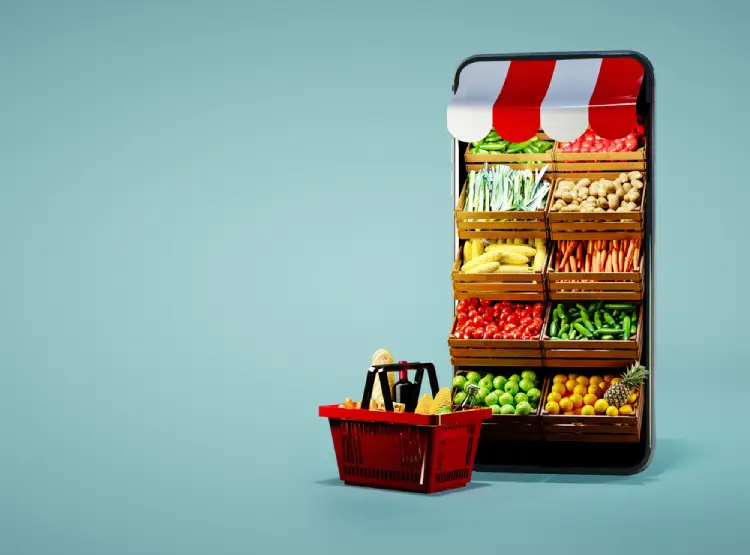In today’s world, where environmental consciousness is growing, eco-friendly grocery shopping business plans have become a crucial part of the sustainable future. These plans not only help in reducing the carbon footprint but also attract environmentally conscious consumers. By implementing key elements in their business strategies, grocery stores can contribute to a greener planet while also ensuring profitability.

The Importance Of Sustainability In The Grocery Industry
The grocery industry plays a significant role in our daily lives, but it also has a substantial impact on the environment. From excessive packaging to food waste, there are many areas where sustainability can be improved. Eco-friendly grocery shopping business plans address these issues by focusing on reducing waste, sourcing sustainable products, and adopting practices that minimize environmental harm.
Market Analysis For Eco-Friendly Grocery Businesses
Before diving into the world of eco-friendly grocery shopping, conducting a thorough market analysis is crucial. Identifying target customers, understanding their preferences, and evaluating the competition helps in developing a unique selling proposition. By analyzing market trends and consumer behavior, grocery businesses can tailor their offerings to meet the demands of environmentally conscious consumers.
The sustainable grocery market is rising 2.7x faster at a CAGR of 7.34%. Better performing grocery delivery platform has 75% of products categorized to meet every necessity for eco-friend grocery business. According to research, 68% of Americans have adopted greener buying habits.
How to start an online grocery delivery business?
Connect with RisingMax today & share your business plan with a signed NDA. We can help you make your imagination a reality.
Key Elements of Successful Eco-Friendly Grocery Shopping Business Plans
Choosing Eco-Friendly Suppliers And Products
One of the fundamental elements of an eco-friendly grocery shopping business plan is selecting suppliers and products that align with sustainable practices. Conducting due diligence on suppliers to ensure they follow ethical and environmentally friendly practices is essential To make sure that your grocery is being eco-conscious while using printed food packaging bags to pack your food items. Organic, locally sourced, and fair-trade products attract eco-conscious consumers, support local communities, and reduce transportation emissions.
Selling Seasonal Food
Rotten foods are also a main factor in environmental pollution. That’s why grocery business owners must keep seasonal food and items to prevent substances from rotting. This also helps in keeping the inventory up-to-date and provides customers with effective grocery services. It requires a little bit of research to know what kinds of groceries are popular and their respective season. This practice also helps increase customer retention in the shop.
Creating A Sustainable Supply Chain
Building a sustainable supply chain is crucial for eco-friendly grocery businesses. This involves optimizing transportation routes to minimize carbon emissions, implementing efficient inventory management systems to reduce food waste, and promoting responsible sourcing practices. By working closely with suppliers, grocery stores can ensure that every step in the supply chain adheres to sustainable principles.
Use EV For Delivery
Vehicle gas causes vast damage to the environment. That is why EVs are preferred for delivery. Using EV stands as taking a big step to make grocery shopping eco-friendly. It reduces air pollution and sound pollution. Also, the demand for EVs is rising as they come at an affordable cost and emit less pollution, helping reduce businesses’ carbon footprints.
Advance your business and electric vehicle fleet management software that can help you in various ways.
Implementing Waste Reduction And Recycling Initiatives
Addressing the issue of waste is a significant aspect of an eco-friendly grocery shopping business plan. Implementing waste reduction and recycling initiatives can significantly minimize the environmental impact of grocery stores. This can include composting organic waste, utilizing reusable or biodegradable packaging materials, and implementing recycling programs for customers. By actively promoting waste reduction, grocery businesses can set an example for consumers and inspire positive change.
Use Of Solar Panel
Solar energy can be used in various ways for eco-friendly grocery shopping businesses. A method called solar-powered irradiation uses solar energy to prevent food from rotting. Solar cookers are also advisable as they use sunlight to cook food and sterilize it. Hence, in these ways, the sun is very effective and powerful in maintaining eco-friendly grocery shopping.
Plant Based Food
Green vegetables are considered more sustainable than animal products because plant-based food requires less water and emits less carbon dioxide. It is estimated that using a plant-based diet can lower carbon footprints by 41.5% compared to meal-based diets. Also, selling in bulk reduces additional packaging waste and decreases biohazard.
Marketing And Promoting Your Eco-Friendly Grocery Business
Effective marketing and promotion are essential to the success of any business, and eco-friendly grocery stores are no exception. Emphasizing the environmental benefits of shopping at a sustainable grocery store through various channels, such as social media, online platforms, and community events, can help attract a wider customer base. Engaging with customers and highlighting the unique aspects of the business, such as partnerships with local farmers or zero-waste initiatives, creates a positive brand image and fosters customer loyalty.
Financial Considerations And Funding Options
While eco-friendly grocery shopping business plans focus on sustainability, financial considerations cannot be ignored. Conducting a thorough financial analysis, including projected revenues and expenses, helps in understanding the viability of the business. Exploring funding options, such as grants, loans, or partnerships with investors who share the same environmental values, can provide the necessary capital to kickstart or expand the grocery business.
How RisingMax Inc. Can Help With an Eco-Friendly Grocery Shopping Business Plan?
RisingMax Inc. is a trailblazing solution provider that helps businesses get their custom solutions budget-friendly and in the meantime. Here are some ways we can support eco-friendly grocery shopping:
AI-Managed Energy
We let businesses adhere to our supply chain management software to plan distance, improve business orders, and reduce waste. AI integration also helps in maintaining inventory and knowing about customers’ preferences. Businesses can improve their business strategy and save time by reducing human efforts.
IoT-Driver Solution
We create IoT-based software that lets grocery businesses work smarter, not harder. IoT applications let business owners track inventory, manage temperature, monitor the safety of foods, and aid in cold chain management.
Remote Work Technologies
2020 has shown how carbon emission is reduced due to remote work technologies. Remote work procedures like scheduled pickup, remote orders, and sending information and requirements can help decrease greenhouse gas emissions. It also decreases the consumption of fossil fuels and reduces power consumption.
Bottom Line
As consumers become more environmentally conscious, eco-friendly grocery shopping business plans are gaining momentum. By incorporating key elements such as choosing eco-friendly suppliers and products, creating a sustainable supply chain, implementing waste reduction initiatives, and effective marketing, grocery stores can contribute to a sustainable future while also thriving in the market.
Embracing sustainability not only benefits the environment but also attracts a growing customer base that prioritizes conscious consumption. By adopting eco-friendly practices, grocery businesses can lead the way in building a greener future.












